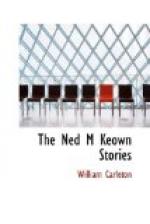That the Irish either were or are a people remarkable for making bulls or blunders, is an imputation utterly unfounded, and in every sense untrue. The source of this error on the part of our neighbors is, however, readily traced. The language of our people has been for centuries, and is up to the present day, in a transition state. The English tongue is gradually superseding the Irish. In my own native place, for instance, there is not by any means so much Irish spoken now, as there was about twenty or five-and-twenty years ago. This fact, then, will easily account for the ridicule which is, and I fear ever will be, unjustly heaped upon those who are found to use a language which they do not properly understand. In the early periods of communication between the countries, when they stood in a hostile relation to each other, and even long afterwards, it was not surprising that “the wild Irishman” who expressed himself with difficulty, and often impressed the idiom of his own language upon one with which he was not familiar, should incur, in the opinion of those who were strongly prejudiced against him, the character of making the bulls and blunders attributed to him. Such was the fact, and such the origin of this national slander upon his intellect,—a slander which, like every other, originates from the prejudice of those who were unacquainted with the quickness and clearness of thought that in general characterizes the language of our people. At this moment there is no man acquainted with the inhabitants of the two countries, who does not know, that where the English is vernacular in Ireland, it is spoken with far more purity, and grammatical precision than is to be heard beyond the Channel. Those, then, who are in the habit of defending what are termed our bulls, or of apologizing for them, do us injustice; and Miss Edgeworth herself, when writing an essay upon the subject, wrote an essay upon that which does not, and never did exist. These observations, then, easily account for the view of us which has always been taken in the dramatic portion of English literature. There the Irishman was drawn in every instance as the object of ridicule, and consequently of contempt; for it is incontrovertibly true, that the man whom you laugh at you will soon despise.
In every point of view this was wrong, but principally in a political one. At that time England and Englishmen knew very little of Ireland, and, consequently, the principal opportunities afforded them of appreciating our character were found on the stage. Of course, it was very natural that the erroneous estimate of us which they formed there should influence them everywhere else. We cannot sympathize with, and laugh at, the same object at the same time; and if the Irishman found himself undeservedly the object of coarse and unjust ridicule, it was not very unnatural that he should requite it with a prejudice against the principles and feelings of Englishmen, quite as strong as that




